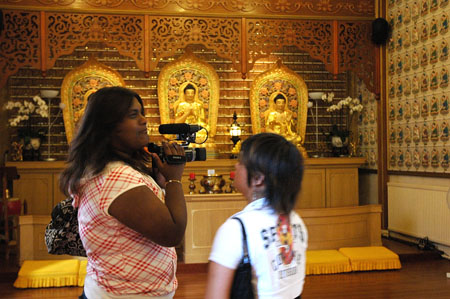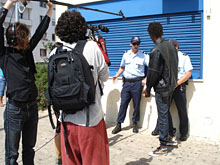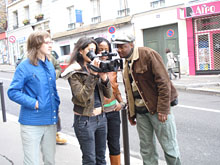The Project
BELONGING is a transnational initiative designed to enable young people to explore intercultural dialogue – grounded in the specificity of personal and social opportunities, as well as the challenges which arise around new migrations and the making of new communities.
Working in urban locations with young people from culturally mixed backgrounds – in London/Newham, Lisbon suburb/Casal da Boba and Paris/20th arrondissement, the project organized a series of video workshops, one in each location, with key local partners*.
I got to know some things about the people close to me that I did not know before.
Focusing on themes around migration, identities and the making of new communities, BELONGING explored how young people talk about belonging – how layered migrations shape communities, and how young people manage multiple, flexible identities while belonging to more than one place.
Working with creative video artists and film-makers -- in small groups --- the project led to each young participant making his/her own film on the subject of his/her choice. The objective was to deliver youth voices and perspectives on these major issues, through video, and to ensure that these voices are heard by different audiences - their local community as well as maistream audiences, institutions and policy makers in the 3 country locations.
The 43 short films which resulted from the workshops provide an interesting picture of life today and a valuable insight into the contemporary thoughts of young people in city contexts. Interestingly, the films show how the idea of belonging has been interpreted in a wider sense in both Portugal and France: in both locations, belonging is at different times about neighbourhoods, about social experiences, and about personal existential attitudes. It is not just a matter of cultural identities, as in the London case.
More about the project
The project was also designed to see how the young people would approach issues of sharing space (conviviality, territories) in culturally mixed urban neighbourhoods.
What we have learnt is that the way young people feel is determined by a range of things including intergenerational issues, male/female relationships, fear and danger in the streets, the role of the police (especially in Paris) as well as many other facets of life. A recurrent theme in all three locations is doing nothing, having nothing to do and being bored; so too are issues relating to peer pressure, and being influenced and manipulated by others. Unsurprisingly, scenes of habitual prejudice and daily life racism are also represented in some of the films.
Chosen for their distinctive nature, each of the three city locations has its own local history. This individual nature appears in the background in most of the films, and in some it comes very much to the fore.

© Benedict Hilliard 2008
Newham was chosen for its diversity and the films represent the mix of the borough, with a strong presence of young people of Asian origin, as well as a new generation of migrants from Eastern Europe. The London videos represent a colourful account of what belonging means for young people residents. The diversity of clothes, food, fabric and people provides a vivid picture of the local Asian community. At the same time, some young people talk about what it takes to feel part of where they live, including the struggles to create new communities.
 © Manifesta
© ManifestaCasal da Boba is a district of Lisbon that is home to people whose families came from the Cape Verde Islands. They used to live in slums, but now apartment flats with gas and electricity have replaced the former improvised houses. People of different generations relate what they feel has been lost and gained through this urban resettlement project in terms of belonging, as they explain their nostalgia for the place where they used to live. At the same time, music and dance, and young people’s smiles give a positive feel to this series of films.
 © Manifesta
© Manifesta
Paris 20th is one of the poorest districts within the walls of the city, near the ‘back-door’ of Paris -- a working class area where successive groups of immigrants have settled. Among the social housing estates, we are shown the roughness of life, its difficulties and its dark aspects. Humour, however, is never far from this contemporary snapshot. Here and there, the young people know how to find ways of talking about serious issues while having fun at the same time – they discuss loneliness, being bored, and how absurd it can sometimes seem to be asked to name a country to which you belong.
For more information, please contact Manifesta Director Marion Vargaftig at [email protected]
Footnote: *key local partners
The local partners are Forest Gate City Learning Centre and NewCEYS in London - Newham; Vende-Se Filmes in Lisbon; Collectif Tribudom in Paris
